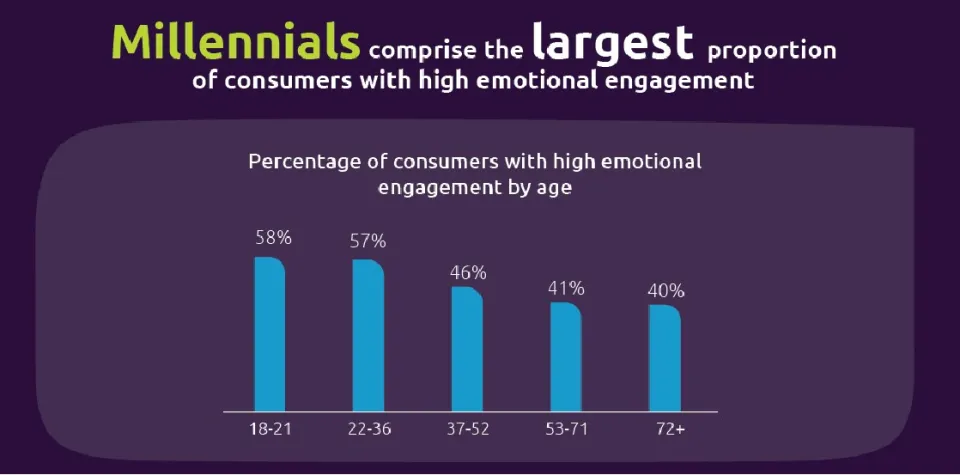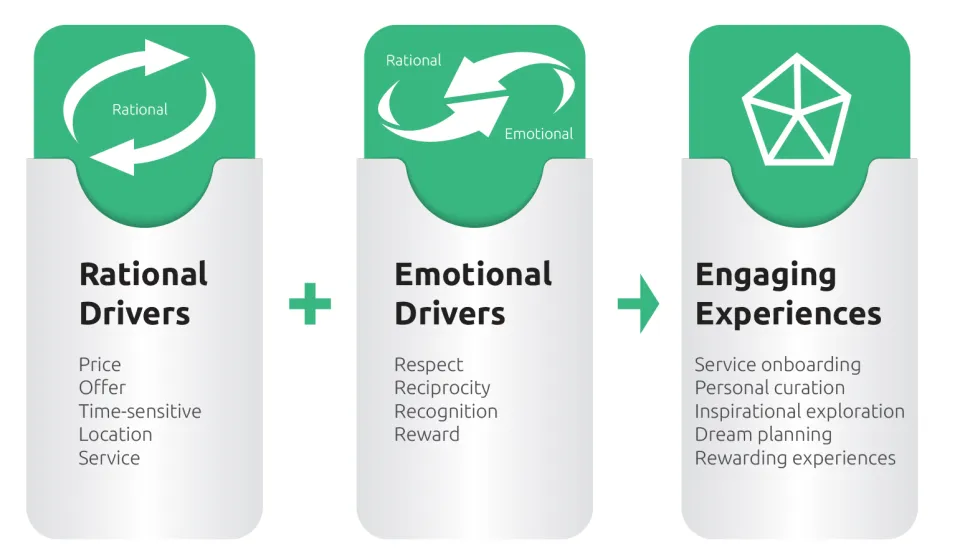Why loyalty programs fail: they lack emotional intelligence
Blog: Capgemini CTO Blog
Organizations spend billions on loyalty programs in an effort engage with their customers, but many loyalty programs leave consumers cold. We have found that there’s a gaping weakness in the current approach – an over-emphasis on rational factors. Our global research shows that it’s emotions such as honesty, integrity, and trust that have the greatest influence on loyalty, as opposed to rational considerations. Colin Shaw, recognized by LinkedIn as a top 150 business influencer and an expert on customer experience, says: “The emotional side absolutely has a greater influence on loyalty than the rational side. Only in recent years are organizations starting to recognize this.”
We, therefore, set out to find a bit more about emotionally engaged consumers and what really makes them tick. We found that the emotionally engaged are very likely to be millennials, as our chart shows. They also prize real-time interactions and multiple ways to interact. This desire for seamless digital interaction is already being recognized by brands. Lemonade – an insurance firm powered by artificial intelligence and behavioral economics – settles claims in 3 seconds with zero paperwork. Today, consumers can order their favorite Domino’s pizza from a multitude of channels, including Amazon Echo, Google Home, and Facebook Messenger.

Source: Loyalty Deciphered: How Emotions Drive Genuine Engagement
Getting this right delivers a significant prize:
- Our research found that emotionally engaged consumers have a significantly higher basket or transaction size. ( spend up to two times or more on brands they are loyal to). We found that 70% of emotionally engaged consumers fall into this camp, but just 49% of the less engaged. Increasing emotional engagement with consumers could drive an up to 5% uplift in annual revenues in retail. Walmart is introducing innovative technologies to assess consumers’ emotional state. It uses video cameras at checkout counters to identify unhappy consumers and dispatch a store worker to see if they can help.
- Consumers with strong emotional engagement also act as brand evangelists. We found that 8 in 10 consumers with high emotional engagement promote the brand among family and friends.
However, we found that opinions are divided on whether brands are in fact getting this right. There is a worrying gap between the perceptions of brand executives and the consumers they serve: 80% of executives say their brand understands the emotional needs and desires of consumers, but only 15% of consumers say that brands do a good job of making an emotional connection.
Closing this gap does not mean ignoring rational factors. We found that 80% of emotionally engaged consumers believe rational factors – such as price competitiveness, promotions, and instant customer service – are important. It’s about striking a balance between emotional and rational drivers, a proposition that we call Human Loyalty. Those that deliver Human Loyalty will shift their consumers from transactional relationships to emotional engagement, successfully securing the long-term loyalty that many existing loyalty programs are failing to deliver.
Approach to drive human loyalty

Source: Digital Transformation Institute
To find out more about the key findings that emerged from our multi-country loyalty survey of over 9,000 consumers and 500 senior executives, read our latest research Loyalty Deciphered: How Emotions Drive Genuine Engagement.